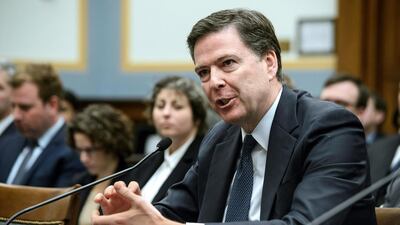Forget the current fuss about Russian hacking of the US Republican and Democratic parties. It is serious. But it is also overblown, as it has been known about for months, and the conclusions about what the ultimate aim of the intrusions was – to undermine the whole process, or support Donald Trump – are contradictory and will probably never be settled conclusively.
No. Far more important is new evidence that suggests that the US presidential election was indeed rigged. But not by Russia, but by a very senior American official – no less than the director of the FBI, James Comey.
Rigged might be too strong a word. But his improper actions in announcing that the bureau was reopening its investigation into Hillary Clinton’s use of a private email server just before the election almost certainly lost her the White House.
According to the renowned US polls analyst Nate Silver, new analysis shows that late voters shifted overwhelmingly towards Donald Trump in the last week of the campaign, moving the swing states of Michigan, Wisconsin and Pennsylvania into the Donald’s column, and making him the president-elect.
“Comey had a large, measurable impact on the race,” he tweeted. “I’ll put it like this: Clinton would almost certainly be president-elect if the election had been held on October 27 (the day before Comey’s letter).”
So let us be clear. Mr Comey had no business making his announcement about the emails. His action swung the election for his fellow Republican, Donald Trump. And for this he is likely to suffer no consequence whatsoever.
If this kind of act can take place with impunity, then we should all be deeply concerned about the state of US democracy – not least since the consequences of the different foreign policy likely to be steered under the forthcoming administration will be, and are already being, felt around the world.
This is not to argue against the legitimacy of Mr Trump’s victory. There is no suggestion that Mr Comey colluded with the Trump campaign, and the president-elect clearly won the electoral college, which is all that counts.
Mr Comey made the announcement about renewing the investigation after emails relating to Mrs Clinton were found on the computer of Anthony Weiner, a disgraced former congressman who is separated from her close aide Huma Abedin.
Neither Mr Comey nor his employees had read these emails when he informed Congress about them. As it happened, they contained nothing new and supported no charges of wrongdoing. But Mr Comey must have known that telling Congress he was reopening the investigation would lead many to assume that they did.
Next, he shouldn’t have been talking about this publicly, or via means that he knew would ensure that it would be made public (ie writing to Congress). The US justice department guidelines state that officials “shall not respond to questions about the existence of an ongoing investigation or comment on its nature or progress”.
Exceptions may be made for “matters that have already received substantial publicity”. But then Mr Comey was the person who hyped up the publicity by declaring Mrs Clinton’s behaviour to be “extremely careless” when he originally announced that the investigation was over in July.
As the Georgetown law professor David Cole put it in the New York Review of Books: “The federal criminal code is Byzantine, to be sure, but carelessness is not a federal crime, and therefore, as FBI director, Comey had no business offering his opinion.
The authority of the nation’s top law enforcement investigator comes with responsibility to weigh one’s words and actions carefully; if anything, it was Comey who was ‘extremely careless’.”
Lastly, Mr Comey violated a long-standing justice department policy that indictments should not be filed, and investigations should not be disclosed, against any individuals running for office in the 60 days before polls.
This policy has been supported by both Republican and Democratic administrations, as two former deputy attorney-generals from the two parties wrote in the Washington Post in late October: “Such actions or disclosures risked undermining the political process. A memorandum reflecting this choice has been issued every four years by multiple attorneys general for a very long time, including in 2016.”
Mr Comey’s actions, concluded Jamie Gorelick and Larry Thompson, were “antithetical to the interests of justice, putting a thumb on the scale of this election and damaging our democracy”.
Harry Reid, the outgoing Democratic leader in the Senate, has called for his staff to look into whether Mr Comey had contravened the Hatch Act, which prohibits officials from using their “authority or influence for the purpose of interfering with or affecting the result of an election”. As it would be necessary to demonstrate intent, it is not clear that the FBI director could be proven to have violated the act.
But Mr Comey acted in so reckless a manner, in clear defiance of bipartisan convention and against the spirit, if not the letter, of the law, that while it may be politically impossible for Mr Obama to dismiss him, it is sincerely to be hoped that one of Mr Trump’s first actions is to aim his most famous catchphrase at the FBI director: “You’re fired.”
If not, to “one man, one vote”, the US may appear to have added a perilous new principle – “one man, one election”.
Sholto Byrnes is a senior fellow at the Institute of Strategic and International Studies Malaysia.


